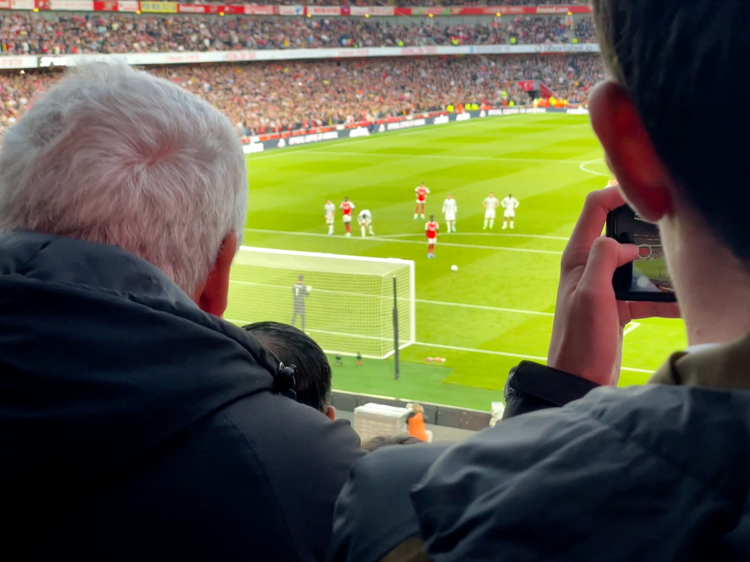5 steps to supercharge British TV
***How an entrepreneurial approach can revitalise our next generation***
This week the UK’s television regulator OFCOM released its latest report on television viewing in the UK.
It continues to show a long-term trend - older people watch linear television, and younger people watch streaming tv.
As the BBC hobbles towards its 100th birthday, our industry seems to be looking away from the impending collapse of our brilliant broadcasting sector; clinging to the hope of a soft landing, rather than boldly stepping up to compete in this amazing new age of on-demand, interactive entertainment.
Streamers like Netflix have won the eyeballs and the hearts of younger generations, and our industry must rapidly readjust to keep pace with this seismic change.
This isn’t a surprise to anyone working in the British television industry.
But it does pose an existential threat to the BBC, ITV, Channel 4 and other organisations that rely on linear TV as their core business model.
Their viewers are dying out. Which means they are running out of customers.
There are still some things that all ages want to watch - The Euros, The Jubilee, major breaking news and Bake Off, which is great.
But the idea of scheduled broadcasts on linear channels only now makes sense for significant live events.
Sitting beneath these large corporations in their supply chains are tens of thousands of small businesses and hundreds of thousands of people whose livelihoods depend on the benevolence of the BBC, ITV and Channel 4.
So, the slow demise of our broadcasters and the rise of the new media global streamers and platforms is a serious issue that also affects our entire culture in the UK.
Why? Because these powerful global streamers have little or no obligation to carry content that offers a public service for our communities.
Young viewers now mostly watch content that entertains but doesn’t necessarily inform or educate.
We risk the cultural detachment of an entire generation.
With the overwhelming amount of content now available to viewers from alternative sources, the BBC license fee looks dead in the water.
Looking further afield, the trend is the same in other countries:
In France, the license fee is being abolished. Their major ad-funded broadcasters are trying to merge to survive.
In Germany, scandals over the potential misuse of public money are likely to lead to change.
And in America, funding for PBS has been a political football for at least a decade
So, with such immense pressures, why aren’t these TV behemoths innovating their way out of the death spiral they find themselves in?
Why don't they see making brilliant content for 13-40-year-olds as a remarkable economic opportunity?
Well, you’d have to ask them.
From the outside, it looks ridiculous that business models aren’t being pivoted, that reaching younger adults with relevant content isn’t being prioritised and that the disruptive business models that supercharged the streamers haven’t been adopted.
What is clear is that the legislative requirements that broadcasters must follow have a significant effect on their ability to go toe-to-toe with global streamers.
Our PSBs are now concentrating their budgets on super-serving their elderly viewers, leaving a huge hole in terms of content for younger adults, and resulting in a lack of interest in working in television amongst young creatives.
Many young producers are instead building their careers on Instagram, TikTok and YouTube. Their success is usually down to mastering a commercial hustle, rather than providing high-quality, informative content.
Instead of sitting and watching the incredibly successful and important British broadcasting sector slowly sink like the Titanic, surely it is high time we do something significant and sustained to revitalise it?
We must bite the bullet and innovate our way into a brilliant third age of broadcasting.
So, I have put together a collection of ideas that would help create a third wave of economic opportunity in our sector:
1️⃣ Forget Public Service Broadcasting - pivot to Public Service Content (PSC).
Viewers increasingly love shows and talent. They are falling out of love with channels. Broadcasters and regulators need to be supported to rethink their priorities. They must now put content origination, production and distribution first, rather than broadcasting. The BBC and ITV are already transitioning towards this new reality, and Channel 4 should be allowed and incentivised to do the same. PSC should be distributed as far and wide as possible - we must go and find audiences, not demand they come to us. This would open the doors for the PSBs to reach much greater numbers of young audiences.
2️⃣ Create a PSC fund for young adults
This money would be used to commission independent producers to make PSC for distribution across multiple platforms. Instead of the content being channelled narrowly into individual channels as is the case with the BBC license fee, it would be distributed aggressively across social, broadcast and streamers to ensure it reaches its audience. The content would be commercially licensed and would create revenues divided between the fund, its producers, and the platforms and broadcasters. This would be subsidised by a temporary 1% tax on UK’s online advertising sales which would run for 5 years. This would make £1bn+ available over the initial term. The fund would share in the spoils of success and should be self-sustaining within five years, negating the ongoing need for the windfall tax.
3️⃣ Require PSC prominence
To operate in the UK, video services like YouTube, Netflix and the like would be required to carry PSC. They would need to make this content prominent for it to reach at least 50%+ of the UK’s video viewing audiences between 13-40. Algorithmic discovery prominence across platforms like YouTube, and channel ordering on TV services like Sky and Freeview would ensure that brands or channels with the highest % of PSC would appear most prominently for 13-40 audiences.
4️⃣ Local production requirement for multinational TV services
Netflix, Amazon, Apple TV+ and the other international video streamers should be required to make at least 30% of their content in the UK, bought from UK-based companies. This mirrors the EU scheme that requires 30% European content to operate in the EU. Importantly, the UK should ensure this quota also applies to the production of new original series, not just catalogue acquisitions. They should also think about requiring this by genre and spend, rather than by the total number of hours available to watch.
5️⃣ Parity in regulation
Content broadcasters, publishers, platforms and streamers should all be regulated on equal terms. Technology means the lines between different types of content are increasingly blurry. In the age of the internet, this is too important not to get right. The well-being of our young people requires it.
These ideas would help us create ongoing economic opportunities for a new wave of brilliant creative entrepreneurs.
They would ensure major content companies can compete on equal terms.
And our younger generations would again get to see brilliant, important PSC which helps them understand an increasingly complex and troubling world.
Let’s stop worrying, moaning and hiding from the inevitable.
None of this is perfect, and it requires a lot of development.
If you're annoyed, outraged, interested or excited by these ideas, please get in touch with me as I'd love to discuss further.




